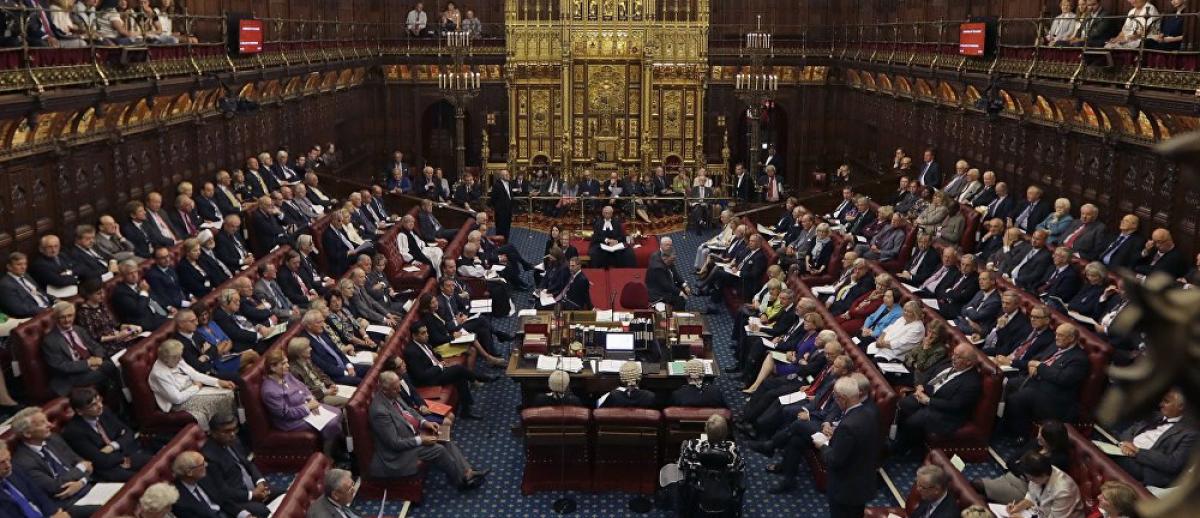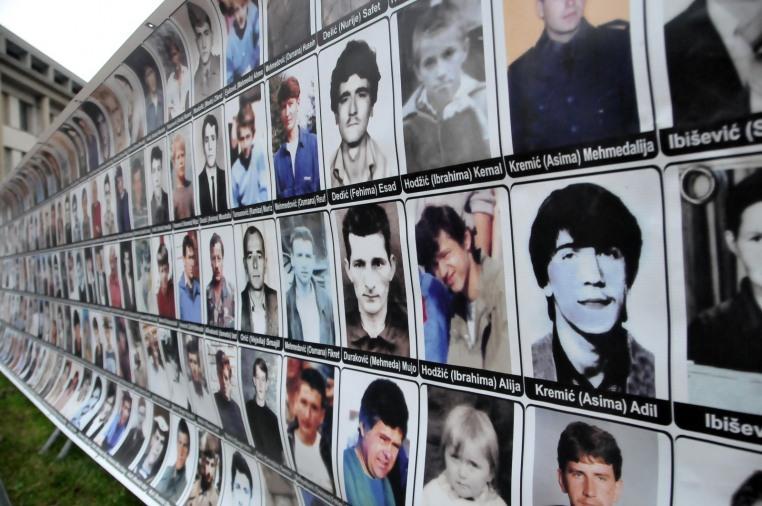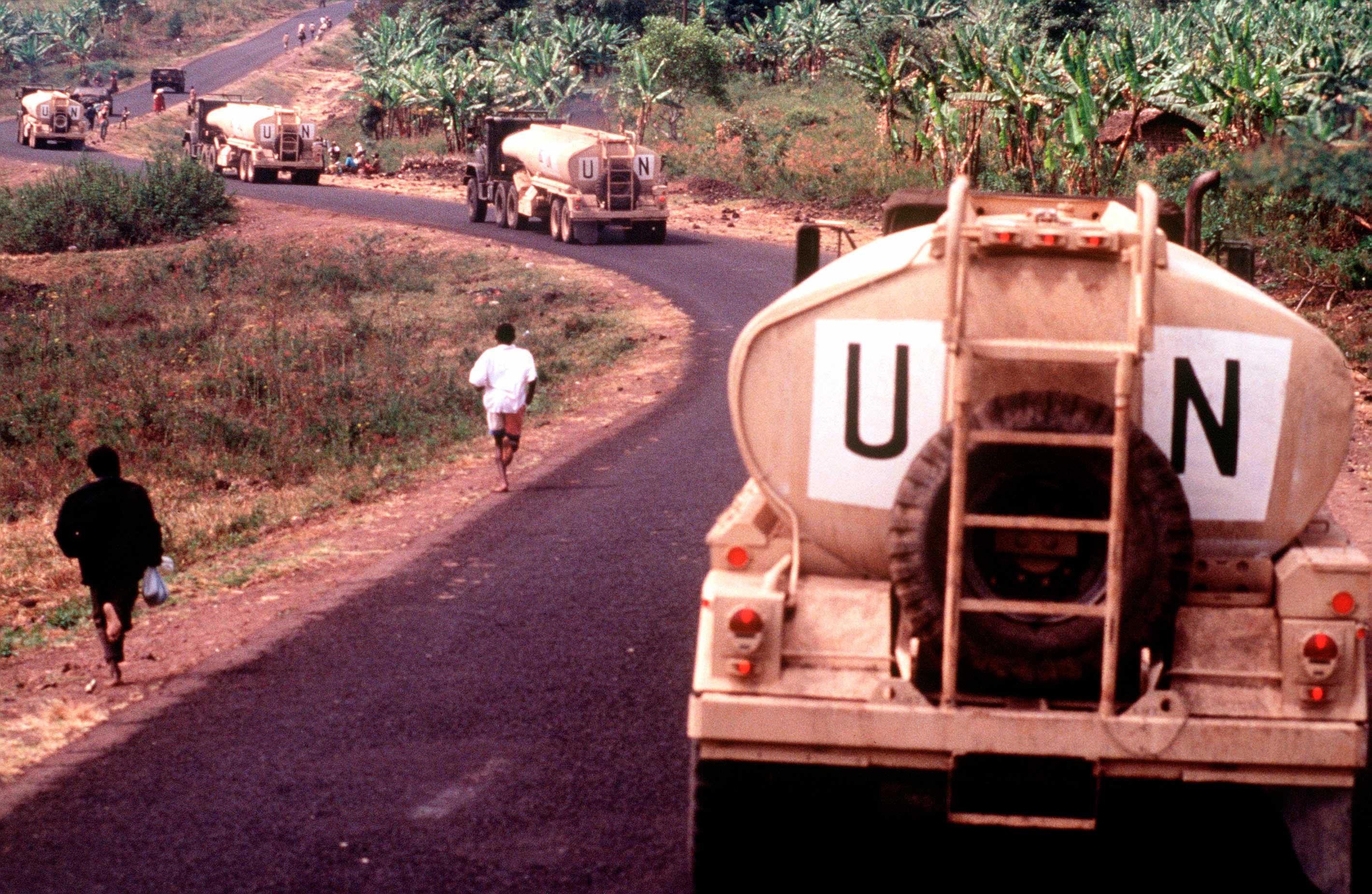Avoiding the ‘G-word’, Evading Obligations to Act
archive


Avoiding the ‘G-word’, Evading Obligations to Act
On Monday, 11 September 2017, the UK’s All-Party Parliamentary Group on the Prevention of Genocide and Crimes Against Humanity was resurrected to launch a Policy Exchange report entitled ‘The Cost of Doing Nothing’. The report—initiated by Jo Cox, and completed by Alison McGovern MP and Tom Tugendhat MP—seeks to quell perceived squeamishness and political aversion to (illegal) military interventions precipitated by the (criminal) invasion of Iraq in 2003. The report asks us to reembrace policies of military intervention and the associated civilian death toll, and expands on a renewed framework for the moral and political justification of military intervention as embodied in the UN initiative 'Responsibility to Protect' (shorthanded to ‘R2P’). In 2005, UN members agreed to submit themselves to an obligation to protect their citizens from “genocide, war crimes, crimes against humanity and ethnic cleansing”—sometimes collectively known as “mass atrocities”—that is, the worst of the defined international crimes plus “ethnic cleansing,” a term without legal definition coined by génocidaires, and popularized and propagated by journalists in the early 1990’s.
I argue here that governments and the UN are over-zealous in the avoidance of genocide determination and instead use the euphemistic term ‘ethnic cleansing’ in the Rohingya case (and elsewhere) for the same reason the Bosnian genocidaires used it—to avoid the Convention’s corresponding legal obligation to prevent. By avoiding legal obligations that must be universally applied, Western states and the UN shift the focus to R2P’s political, discretionary obligations in order to legitimize launching military attacks against ‘enemy’ states (Zollman 2017).
In October 2015, our research team at the International State Crime Initiative, Queen Mary University of London, published Countdown to Annihilation: Genocide in Myanmar following a 12 month study funded the UK Economic and Social Research Council. We argue that the genocidal process was ongoing in Rakhine state, and we demonstrated that institutional stigmatization, discrimination, physical harassment, isolation, and systematic weakening (through deprivation of food, livelihood, and health care) placed the Rohingya at the genocidal stage prior to mass annihilation.
Conditions for the Rohingya have continued to deteriorate since the publication of our report, but since August 2017 a Burmese military operation in Rakhine state has led to a new and deadly phase in the genocidal process. The current situation for the Rohingya was foreseen and avoidable. So how was it allowed to develop? The problem, I argue, lies at a nexus between international law and politics.
The Genocide Convention was drafted with the objective of genocide prevention very much in mind1 and the duty was further clarified by the International Court of Justice, which stated: “[a] State’s obligation to prevent and the corresponding duty to act arise at the instant that the State learns of … the existence of a serious risk that genocide will be committed”2 (emphasis added). Our report outlined a serious risk, but when we notified the British Foreign and Commonwealth Office and other responsible government ministers, the warning was ignored. Moreover, the UK government replied that only a court could make a determination of genocide. This legal chicanery is the preferred avoidance tactic of the UK government. Other states and the UN use the term ‘ethnic cleansing’ to circumnavigate Convention obligations.
governments and the UN… use the euphemistic term ‘ethnic cleansing’ in the Rohingya case (and elsewhere) for the same reason the Bosnian genocidaires used it—to avoid the Convention’s corresponding legal obligation to prevent.
From mid-1991, journalists and politicians began using the term ‘ethnic cleansing’ in the context of genocidal situations. The UN referred to the “new term” of ‘ethnic cleansing’ in 1993 and, as Blum et al argued: “It is ironic that the UN itself adopted a euphemism invented by Milosevic … despite its never having been formally defined or recognized as a term with specific legal status and mandated obligations…”3
While even the UN calls ‘ethnic cleansing’ “a form of genocide,”4 the proliferation of the term as a distinct phenomenon continues unabated, creating a semblance of quasi-legality. The confusion is compounded by commentators and lawyers who often rely on the following International Criminal Tribunal for the former Yugoslavia (ICTY) statement from the Krstić case:
[T]here are obvious similarities between a genocidal policy and the policy commonly known as ‘ethnic cleansing’ … [a] clear distinction must be drawn between physical destruction and mere dissolution of a group. The expulsion of a group or part of a group does not in itself suffice for genocide.5
But this formulation was subsequently overturned on appeal, where the ICTY concluded that the forcible removal of all Bosnian Muslims from Srebrenica eliminated “even the residual possibility that the Muslim community in the area could reconstitute itself.”6

Victims of July 1995 Srebrenica massacre
The Court noted further that:
Even where the method selected will not implement the perpetrator’s intent to the fullest, leaving that destruction incomplete, this ineffectiveness alone does not preclude a finding of genocidal intent.7
‘Inefficient’ methods of annihilation are more likely to be observed in situations where international attention is focused on the perpetrator state’s behavior, as is the case with the current public and media interest in Rakhine state.
Ethnic cleansing is therefore, like murder or rape, an act which when carried out with the intent to destroy, eradicate, or otherwise dissolve a people and its culture, should be considered an act of genocide; however, unlike murder and rape, there is no legal definition of ethnic cleansing whatsoever and so there can be no corresponding legal obligation to prevent it. There is only the politically charged and dubious Responsibility to Protect (R2P) obligation.8 As Zollman explains, ‘humanitarian intervention’ and ‘R2P’ only appear in the UK, US and German news media if ‘enemy’ countries of Western states are the perpetrators of human rights violations. This practice leads to an erosion of internationally agreed norms of non-intervention as enshrined in the UN Charter, as is borne out by the Policy Exchange report.
'It is ironic that the UN itself adopted a euphemism invented by Milosevic… despite its never having been formally defined or recognized as a term with specific legal status and mandated obligations…'
Blum et al outline the use of the terms ‘ethnic cleansing’ and ‘genocide’ in relation to intervention in Bosnia, Rwanda, Kosovo and Darfur. In Bosnia, journalists and governments referred to ‘ethnic cleansing’ from 1991 until the Srebrenica massacre in July 1995. Ten years later, in 2004, the ICTY confirmed that the massacre at Srebrenica was genocide. Two hundred thousand people had been killed. In Rwanda, genocidal killing started in or around 6 April 1994. By the end of April, senior US officials were using the word genocide in private. On 25 May, the US Administration stopped short of a genocide determination and spoke of “acts of genocide.”9 One month later the Rwandan Patriotic Front had killed 800,000 people. In Kigali in 1998, Clinton apologized for not calling the crimes genocide sooner. Kosovo was called ‘ethnic cleansing’ until US War Crimes Ambassador (David Scheffer) spoke of “indicators of genocide” on 7 April 1999. Belgrade was subsequently bombed, the Serbs surrendered, and NATO occupied Kosovo. There has been no judicial determination of genocide. Twenty thousand people were killed. On 9 September 2004, US Secretary of State (Colin Powell) acknowledged the genocide while semantically undermining its political value and thereby avoiding the implications of international legal obligations.10 The International Criminal Court has charged Omar al-Bashir and others with genocide in Darfur, but no one has been arrested to date even though more than 400,000 Darfuris have been killed. The same kind of analysis of Syria, Yemen, and others would likely confirm this pattern of avoidance of the ‘g-word’ until an invasion is imminent and R2P is invoked, which allows for intervention (or not) whenever it suits. Blum et al outline the use of the terms ‘ethnic cleansing’ and ‘genocide’ in relation to intervention in Bosnia, Rwanda, Kosovo and Darfur. In Bosnia, journalists and governments referred to ‘ethnic cleansing’ from 1991 until the Srebrenica massacre in July 1995. Ten years later, in 2004, the ICTY confirmed that the massacre at Srebrenica was genocide. Two hundred thousand people had been killed. In Rwanda, genocidal killing started in or around 6 April 1994. By the end of April, senior US officials were using the word genocide in private. On 25 May, the US Administration stopped short of a genocide determination and spoke of “acts of genocide.”9 One month later the Rwandan Patriotic Front had killed 800,000 people. In Kigali in 1998, Clinton apologized for not calling the crimes genocide sooner. Kosovo was called ‘ethnic cleansing’ until US War Crimes Ambassador (David Scheffer) spoke of “indicators of genocide” on 7 April 1999. Belgrade was subsequently bombed, the Serbs surrendered, and NATO occupied Kosovo. There has been no judicial determination of genocide. Twenty thousand people were killed. On 9 September 2004, US Secretary of State (Colin Powell) acknowledged the genocide while semantically undermining its political value and thereby avoiding the implications of international legal obligations.10 The International Criminal Court has charged Omar al-Bashir and others with genocide in Darfur, but no one has been arrested to date even though more than 400,000 Darfuris have been killed. The same kind of analysis of Syria, Yemen, and others would likely confirm this pattern of avoidance of the ‘g-word’ until an invasion is imminent and R2P is invoked, which allows for intervention (or not) whenever it suits.

Rwanda, July 1994
Mindful of state-level efforts to avoid an extra-judicial genocide determination, there are now (thanks to Barak Obama) modalities for forcing the issue in the USA. The Simon-Skjodt Center for the Prevention of Genocide (at the Holocaust Memorial) has formed its ‘Committee on Conscience’, which is mandated to raise the alarm “to halt acts of genocide or related crimes against humanity." In September 2015, the deputy director of the Simon-Skjodt Center, Naomi Kikoler, went on a ‘Bearing Witness’ trip to northern Iraq and found that Daesh had perpetrated genocide against the Yezidis. Following resolutions by the Council of Europe in January 2016, the European Parliament in February 2016, and the US House of Representatives, US Secretary of State John Kerry confirmed in March 2016 that the US government had determined that Daesh had perpetrated genocide and crimes against humanity involving minorities in northern Iraq.
However, regarding the Yezidi genocide (and other alleged instances), the UK Government Ministers have repeatedly stated, “it is a long-standing Government policy that any judgements on whether genocide has occurred should be a matter for the international judicial system rather than legislatures, governments or other non-judicial bodies.”11 In other words, the UK government requires the crime be completed and prosecuted (a process that can take decades) before acting—making a complete mockery of the prevention elements of the Convention, belatedly accessioned by the UK in 1970.
Frustrated by the UK’s stance, Lord David Alton of Liverpool has introduced into the UK parliamentary system the Genocide Determination Bill, to “provide for the High Court of England and Wales to make a preliminary finding on cases of alleged genocide; and for the subsequent referral of such findings to the International Criminal Court or a special tribunal.” The private members’ bill had its first reading on 13 June 2016 but a snap election stalled it. Lord Alton re-introduced the Bill and it had its first reading on 13 July 2017.
the UK government requires the crime be completed and prosecuted... before acting—making a complete mockery of the prevention elements of the Convention, belatedly accessioned by the UK in 1970.
The Rohingya currently face annihilation and need genocide prevention protections. Countless have been killed and the rest are being driven off their land into Bangladesh by a terror campaign characterized by murder, rape, sexual assault, torture, and destruction of property. The dire humanitarian conditions in Bangladesh were foreseeable to the Burmese government and are consistent with conditions designed to bring about the destruction of the Rohingya. Meanwhile, despite UN and civil society declarations that call for decisive action, state actors have stood by silently in the face of incontrovertible facts.
1 The Convention on the Prevention and Punishment of the Crime of Genocide,
Committees in United Nations: UNGA Resolution 96 (I), 11 November 1946.
2 Bosnia and Herzegovina vs. Serbia and Montenegro: Case Concerning
the Crime of Genocide (26 February 2007), para. 431.
3 Rony Blum, Gregory H. Stanton, Shira Sagi and Elihu D. Richter (2007)
Journal of Public Health, 1–6 (available at
http://docs.wixstatic.com/ugd/e5b74f_61ce668e4f4548e3b98c3bb460ab1962.pdf).
4 United Nations General Assembly resolution 47/121, 18 December 1992.
5 Case No.: IT-98-33-T, Trial Chamber Judgment, 2 August 2001, para. 562.
6 Case No.: IT-98-33-A, Appeal Chamber Judgment, 19 April 2004, para 31.
7 Case No.: IT-98-33-A, Appeal Chamber Judgment, 19 April 2004, para 32.
8 See Florian Zollmann (2017). Media, Propaganda and the Politics of
https://www.peterlang.com/view/product/31151
9 Quoted in Rory Carroll (2004). "US chose to ignore Rwandan genocide."
10 Powell declared that:
seem to have been waiting for this determination of genocide to take
action. In fact, however, no new action is dictated by this determination.
We have been doing everything we can to get the Sudanese government
to act responsibly. So let us not be preoccupied with this designation of
genocide. […] Call it a civil war. Call it ethnic cleansing. Call it genocide.
Call it ‘none of the above’. The reality is the same: there are people in
Darfur who desperately need our help."
See: https://2001-2009.state.gov/secretary/former/powell/remarks/36032.htm



